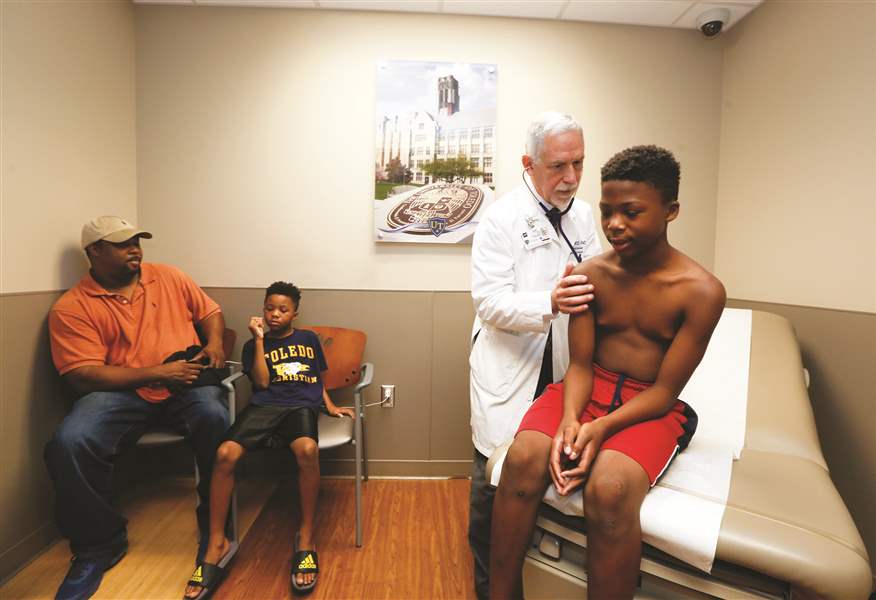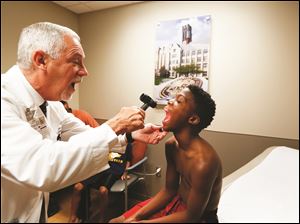
Mandatory sports physicals uncover medical concerns for student-athletes
7/24/2017

Dr. David Weldy examines Jordan Taylor as Jordan's father, Roy, and his brother, Joshua, look on.
The Blade/Jetta Fraser
Buy This Image
Student athletes across Ohio are gearing up for another competition season, which means parents are scheduling the annual physical required before their children can hit the court or turf.
Sports physicals are a way to catch medical concerns “that might place the athletes at risk for serious injury or medical complications,” said Dr. David Weldy, a physician and associate professor of family and sports medicine at the University of Toledo College of Medicine and Life Sciences, formerly the Medical College of Ohio.

Dr. David Weldy examines Jordan Taylor as Jordan's father, Roy, and his brother, Joshua, look on.
The Ohio High School Athletic Association requires all participating athletes to undergo a sports physical on an annual basis. The exam is an opportunity to get a “top to bottom physical exam” that covers items such as asthma, joint health, and cardiac and neurological concerns, Dr. Weldy said.
“There is an emphasis on things like concussion and previous head injuries, as well as cardiac status,” he said. “One of our concerns is sudden cardiac arrhythmia [an irregular
heartbeat] ...They are rare but they do happen.”
One area growing in popularity during such exams is a depression screening, Dr. Weldy said.
“It’s something that is often missed, athletes are good at hiding it,” he said of depression. “Th ere has been some push to be a bit [better at] screening for the participation physical.”
Depression screenings are not currently standard for sports physicals but it’s an increasingly popular topic of discussion, said Dr. Weldy, who is also a member of the Ohio State Medical Association’s Joint Advisory Committee on Sports Medicine.
“I think it’s [because of] a recognition that depression is much more prevalent than had been appreciated previously,” he said. “There is a greater awareness overall, not just in athletics.”
For students who might not have a regular doctor, sports physicals can flag other health concerns, but is not a replacement for an annual checkup, he said.

Dr. David Weldy examines Jordan, who was required to pass a sports physical before he can play youth football.
“It is not necessarily a time to check on immunization status or other routine health things,” he said. “A comprehensive family history is not usually taken — asthma, yes, but there wouldn’t be anything about cancer family history.”
A sports physical might alert doctors to other health concerns, including poor vision or issues that require referrals to specialists.
Dr. Kehinde Obeto, a pediatrician with Mercy Health-Navarre Pediatrics, said parents of all children, not just athletes, should be thinking about annual physicals to make sure students are up to date on vaccines, and depending on age get screens for hemoglobin levels, lead exposure, depression, and cholesterol.
“They need to call and schedule it because they fill up fast,” she said. “If you wait too long you might have to wait.” And don’t forget about teeth and eyes, she said.
Poor vision can inhibit athletic and academic performance, Dr. Preston Linley of ProMedica Eye Care.
“The eyes get underrated,” he said. “A lot of times parents don't know their kids have visual issues and kids don't know they aren't seeing as well as they can be.”
He recommended a comprehensive eye exam for kids between ages 3 and 5 before they enter school.
Starting with the 2016-2017 school year, Ohio required seventh graders to be vaccinated against certain forms of meningococcal disease, which can lead to meningitis.
Students entering 12th grade are now required to get a second dose of the vaccine, unless the first round was completed after their 16th birthday.
Nearly 300 TPS students were held out of school for at least part of a day last fall for lacking documentation showing they had had the meningitis vaccine or had submitted a waiver.
In addition to area physician offices and pharmacies, the Toledo-Lucas County Health Department offers all required vaccinations through its “Shots 4 Tots n Teens” program.
For upcoming times and locations, call the health department at 419-213-4121 or visit lucascountyhealth.com.
Parents must bring a child’s immunization record, insurance card, and a parent’s identification card. No child will be turned away for inability to pay.
A copy of the pre-participation exam form used by physicians in compliance with the Ohio High School Athletic Association is available at ohsaa.org/medicine/physicalexamform.
Contact Lauren Lindstrom at llindstrom@theblade.com, 419-724-6154 or on Twitter @lelindstrom.